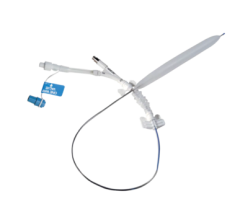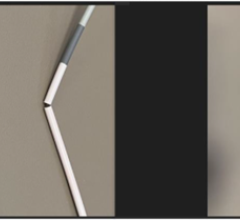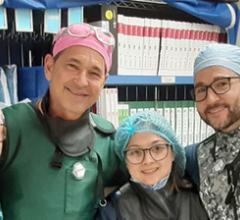
Image courtesy of Cardionovum
December 19, 2014 — Cardionovum GmbH announced that it has initiated a 150-patient clinical study of its novel paclitaxel-releasing, high-pressure shunt balloon dilatation catheter, Aperto.
Regardless of whether it is created as an arterio-venous fistula (AVF) or as a shunt graft, hemodialysis shunt patency is threatened by restenosis, which is the No. 1 cause of hemodialysis shunt failure and a dreaded complication in the treatment of hemodialysis-dependent, end-stage renal disease patients. Short-cutting the arterial and venous vascular system to create a hemodialysis shunt results in hemodynamic pressure and blood flow gradients that are crucial to enable hemodialysis but which induce as a downside the formation of neo-intimal hyperplasia and stenosis. As the patency of the shunt is essential for the survival of the patients, the suppression of neo-intimal hyperplasia is the logical way to lower the frequency of the necessary shunt interventions and prolong overall hemodialysis shunt patency.
Hemodialysis shunt stenosis treatment with Aperto adds an anti-inflammatory and anti-proliferative therapeutic effect to the conventional, purely mechanical angioplasty procedure, which is currently widely used to treat hemodialysis vessel stenosis.
“The application of Aperto promises a substantial reduction of hemodialysis shunt restenosis for a prolonged dialysis access survival. This means less shunt re-interventions for a better patient life quality,” said William Loan, M.D., principal study investigator at the National Vascular Hospital, Belfast, Ireland.
Aperto’s “Intense” drug release composition coating is designed for the treatment of the complex restenotic and scarred hemodialysis shunt tissue and prolongs significantly the interval until the unavoidable re-intervention. By comparison, the conventional, purely mechanical angioplasty procedure’s mode of action catalyzes excessive mechanical stress with consecutive disruption of the vessel intima and media, as well as tension on the adventitia. The purely mechanical treatment triggers the migration and proliferation of fibroblasts, myofibroblasts, smooth muscle cells and further contributes to the development of consecutive neo-intimal hyperplasia.
Early clinical data with Aperto have shown that the negative cycle of repeated, purely mechanical shunt treatments are reduced significantly.
For more information: www.cardionovum.eu


 June 13, 2024
June 13, 2024 









